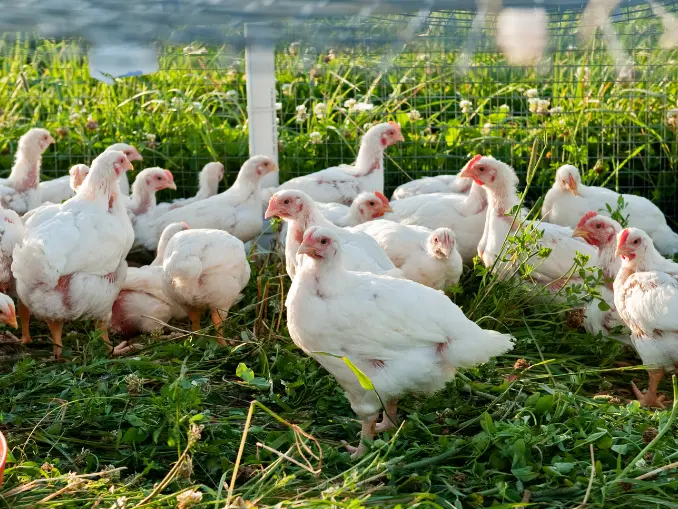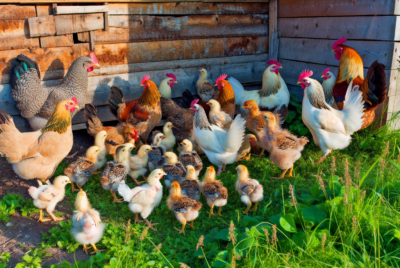10 Essential Tips for Raising Meat Chickens
Do you dream of raising your own meat chickens to provide your family with fresh, ethically sourced poultry? If so, you’re in the right place. With the increasing demand for sustainability and transparency in our food system, more and more people are deciding to raise their own meat chickens.
But how can you ensure that you’re raising these birds in a way that respects their well-being, produces high-quality meat, and minimizes your environmental impact? Read on to discover my 10 essential tips for raising meat chickens and embark on your journey towards a healthier, more self-sufficient lifestyle.
Choosing the Right Breed for Your Needs
The first step to a successful and rewarding experience in raising meat chickens is selecting the perfect breed from various poultry meat birds, including meat chicken breeds.
Factors such as growth rate, flavor, size, and overall wellness should be considered when deciding. Among the top choices for meat birds are the Cornish Cross, Red Rangers, and dual-purpose breeds like Plymouth Rock or Rhode Island Red.
Cornish Cross chickens are known for their rapid growth and substantial breast meat, making them a popular choice for raising meat birds efficiently.
Red Rangers, on the other hand, grow at a slower rate but are valued for their excellent flavor and ability to forage for their own food. Among various chicken breeds, dual-purpose breeds can serve as both egg layers and meat providers, offering versatility for those who want the best of both worlds.
Choosing a breed that aligns with your goals and preferences is vital in raising meat birds, also known as raising meat chickens.
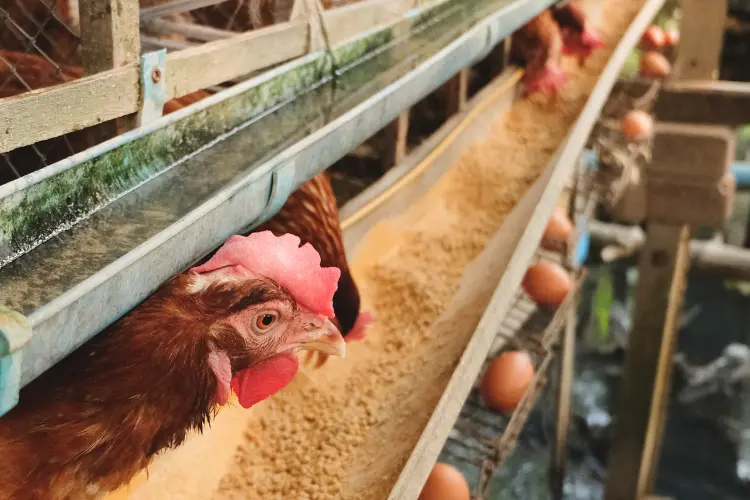
Preparing Your Coop and Brooder
Bedding Materials
For a clean and healthy environment, softwood chips, such as pine shavings, are an excellent choice for bedding materials in a chicken coop. Other options include straw, sand, and shredded paper.
Replacing bedding materials as needed is vital for cleanliness, thereby providing your meat chickens a comfortable and hygienic living space.
Temperature Control
Temperature control is crucial for raising healthy chicks, especially during their first few weeks of life. Heat lamps are an effective way to maintain the optimal temperature in a chicken coop. By adjusting the height of the heat lamps, you can ensure that the temperature stays within the ideal range of 65 to 75 degrees Fahrenheit.
Regular monitoring and adjustment of the temperature, using heat lamps, is necessary for the comfort and growth of your chicks. In their first week, baby chicks require a temperature of 95 degrees, which can be lowered by 5 degrees each week until they are ready to transition to pasture or free range.
Space Requirements
Providing enough space for your meat chickens to move around and grow without overcrowding is essential for their health and development. The suggested space requirements for meat chickens are 4-5 square feet per bird.
Ensuring ample room for the laying hens to roam and develop aids in avoiding overcrowding and promoting a healthy, productive environment for raising chickens.
Feeding Your Meat Chickens
Feeding your meat chickens involves a balanced diet with enough protein to ensure proper growth and health. Start with chick starter feed when they first arrive. Then, transition to grower feed as they grow. Finally, switch to finisher feed when they are close to reaching their desired weight.
I suggest avoiding free-choice feeding, which can lead to growth issues for your meat birds.
For a flock of 25 meat birds weighing 5 pounds at butcher time, you’ll need 5 fifty-pound bags of feed for optimal growth. Providing your meat chickens with a balanced diet guarantees healthy development and high-quality meat production.
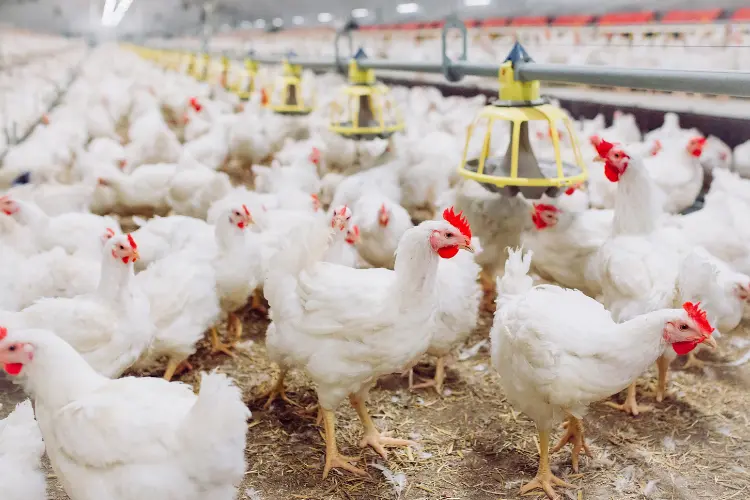
Providing Fresh Water and Grit
In addition to a balanced diet, it’s essential to provide your meat chickens with fresh water and grit to aid in digestion and overall health. Make sure there’s enough space for at least half of the chicks to drink simultaneously to ensure proper hydration for all your birds.
Ensuring a continuous supply of fresh water and grit contributes to the well-being and healthy growth of your meat chickens.
Ensuring Proper Ventilation and Protection
Proper ventilation and protection are crucial for maintaining the health and well-being of your meat chickens in their coop and brooder. To ensure optimal ventilation, you should:
Provide 3-4 square feet of ventilation in cold weather
Provide 1 square foot of ventilation per 10 square feet of coop floor space in warm weather climates
Have 1/5th of the coop walls be windows or vents to help maintain fresh air circulation and prevent a stuffy environment for your birds.
In addition to ventilation, protecting your meat chickens from harsh weather conditions is important to keep them safe and healthy. Provide shade and ensure their food and water are nearby so that they have easy access to these necessities.
Monitoring Growth and Health
Regularly monitoring the growth and health of your meat chickens is essential for detecting any signs of illness or injury early on. Be on the lookout for signs of respiratory illness, such as sneezing, coughing, or wheezing; signs of digestive illness, like diarrhea; and signs of injury, like limping or feather loss.
To ensure a healthy environment for your meat chicks, clean the coop regularly, supply fresh bedding, and maintain clean water and feeders. Close monitoring of your meat chickens’ health allows for prompt addressing of any issues, ensuring their well-being throughout the entire process.
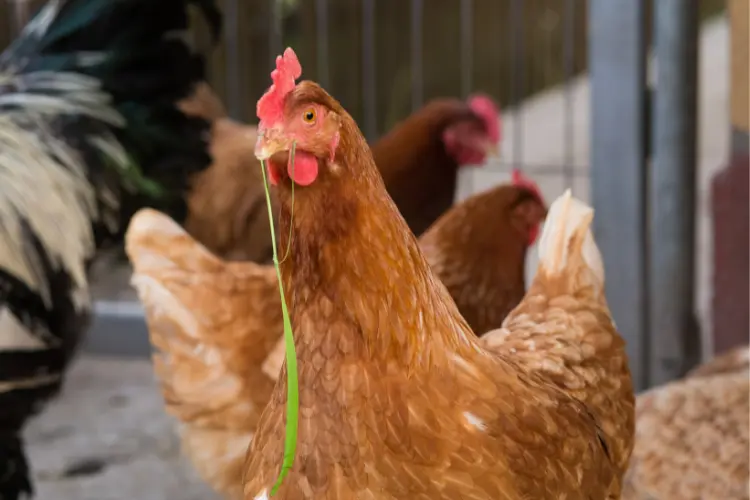
Transitioning to Pasture or Free Range
Once your meat chickens are ready, it’s time to transition them to pasture or free-range areas to provide a more natural diet, including access to fresh grass and bugs. Here’s how to do it:
During week 3, move them to a chicken tractor with a heat lamp installed.
- Gradually introduce them to the outdoor environment by letting them spend short periods outside each day.
Remove the heat lamp during week 4 and place them on pasture full-time.
Moving the chicken tractor every 2 weeks is recommended to give your chickens access to fresh grazing areas. Setting up fencing in the pasture will help contain the chickens and allow them to fertilize the area, contributing to a sustainable and eco-friendly approach to raising meat chickens.
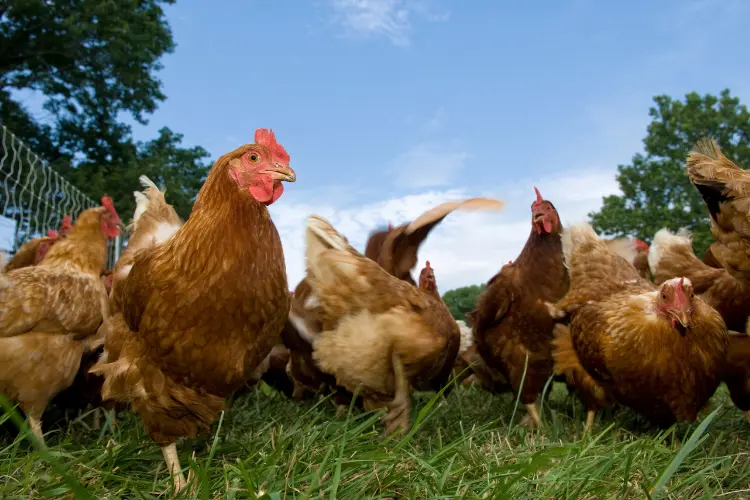
Planning for Butchering Day
Planning for butchering day is an important aspect of raising meat chickens. Mark your calendar based on the breed’s growth rate, typically eight to ten weeks for breeds like Cornish Cross, and have the necessary equipment ready in advance. Renting chicken butchering equipment from county extension offices can be an affordable option, costing only $25.
As you approach butchering day, ensure that you treat your meat chickens with care and compassion during the process. Planning ahead and preparing for this final step facilitates a smooth and efficient butchering process, yielding fresh, ethically sourced poultry for your family.
Ethical Considerations in Raising Meat Chickens
When raising meat chickens, it’s important to consider the ethical aspects of your endeavor. This includes humane treatment of the birds, avoiding emotional attachment, and balancing cost and convenience with the birds’ well-being.
By raising your meat-raising chickens, you can take control of the quality and source of your food, ensuring that the birds are treated with respect and compassion throughout their lives.
The decision to raise meat chickens is ultimately a personal one, and finding a balance between the practical aspects of raising poultry and the ethical considerations is crucial.
Frequently Asked Questions
How Long Does It Take To Raise Meat Chickens?
Raising meat chickens typically takes between six and eight weeks for broilers, or 8-12 weeks for slower growing breeds such as Red Rangers and Freedom Rangers. Heritage breeds like New Hampshire chickens may take up to 16 weeks to reach harvest weight.
At What Age Do You Butcher Meat Chickens?
Chickens are typically slaughtered for meat at 6-7 weeks old, when they weigh 3 to 5 lbs and have a 2.5 to 4 lbs carcass. However, the age of chickens used for meat can range from 6 weeks to 12 years old.
Wrapping It Up
Raising meat chickens can be a fulfilling and rewarding experience, providing you with fresh, ethically sourced poultry while also contributing to a more sustainable food system.
Embarking on this journey may require some effort, but the benefits of raising your own meat chickens ethically and sustainably are well worth it. So why not give it a try? You might just discover a newfound passion and sense of fulfillment in providing your family with healthy, delicious poultry that you raised yourself.

